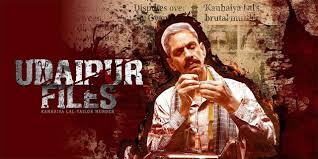Supreme Court to await Centre’s decision on release of ‘Udaipur Files’; hearing on Monday

The Supreme Court has put the release of Udaipur Files on hold. It asked the filmmakers to wait for the Centre’s decision on the film’s certification. The court stressed that the right to a fair trial must come before the right to free speech.
A Film Based on a Shocking Crime
Udaipur Files depicts the 2022 murder of Kanhaiya Lal, a tailor in Udaipur, Rajasthan. He was killed in a violent attack, allegedly over a social media post. The incident shocked the nation and sparked strong reactions. The accused are still facing trial under the National Investigation Agency (NIA).
The film, however, has stirred controversy. Critics say it names the accused and may influence public opinion. Legal experts fear it could affect the trial’s fairness and incite unrest.
Supreme Court: Fair Trial Comes First
A bench of Justices Surya Kant and Joymalya Bagchi heard the case. They said the right to life and fair trial under Article 21 outweighs free speech under Article 19. They warned that once a film is released, its impact cannot be reversed.
The court pointed out that if the film harms the accused’s reputation, they may never recover from it. The judges stressed the need for caution, especially when a trial is ongoing.
Centre Reviews Certification Under Cinematograph Act
The Centre had invoked Section 6 of the Cinematograph Act, 1952. This section allows the government to withdraw a film’s certificate if it poses a risk to law and order.
On Tuesday, a government committee met at 2:30 p.m. to hear objections against the film. The Supreme Court postponed its next hearing to Monday, July 21, to allow the committee time to decide.
The court said both the filmmakers and the petitioners could present their views before the committee.
Petitioners Say Film Could Prejudice Trial
The family of one of the accused filed the petition. They argued that the movie identifies the accused before a verdict has been reached. They fear the film could influence public opinion and the court’s judgment.
Their lawyers also warned that the movie might create communal tension. They urged the government to act before it causes unrest in sensitive regions.
Filmmakers Defend Their Work
The film’s producers defended their right to creative freedom. They said the movie is based on publicly available facts. The Central Board of Film Certification (CBFC) had already cleared it.
They added that the film honors the victim and raises awareness about religious extremism. They also claimed they had avoided revealing the identities of the accused in promotions.
However, the court was not convinced. It noted that the trailer already implied guilt and could affect the trial’s fairness.
Security for Victim’s Family and Film Team
The court addressed reports of threats to the filmmakers and the victim’s family. It allowed them to seek police protection. The court directed the police to evaluate the threats and act if needed.
The judges made it clear: free speech must not come at the cost of anyone’s safety.
What Happens Next?
The Centre’s committee will soon deliver its verdict. The Supreme Court will review that decision in the next hearing.
If the committee upholds the film’s release, the legal battle may continue. If it revokes the certification, the filmmakers may challenge that ruling.
Conclusion
The Udaipur Files case highlights the tension between free speech and a fair trial. Films that depict real crimes must walk a fine line. They must inform without interfering with justice.
The Supreme Court has chosen to proceed with caution. It aims to protect both constitutional values and public order. All eyes are now on the Centre’s decision and the court’s hearing next Monday.






